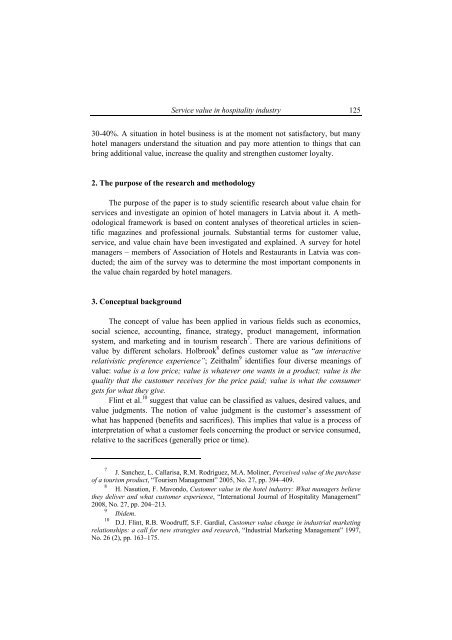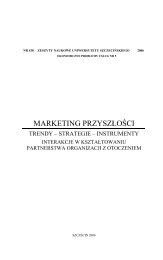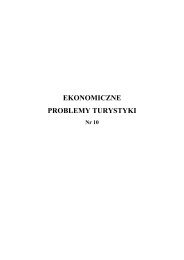Zeszyt naukowy - caÅoÅÄ - WydziaÅ ZarzÄ dzania i Ekonomiki UsÅug
Zeszyt naukowy - caÅoÅÄ - WydziaÅ ZarzÄ dzania i Ekonomiki UsÅug
Zeszyt naukowy - caÅoÅÄ - WydziaÅ ZarzÄ dzania i Ekonomiki UsÅug
Create successful ePaper yourself
Turn your PDF publications into a flip-book with our unique Google optimized e-Paper software.
Service value in hospitality industry 125<br />
30-40%. A situation in hotel business is at the moment not satisfactory, but many<br />
hotel managers understand the situation and pay more attention to things that can<br />
bring additional value, increase the quality and strengthen customer loyalty.<br />
2. The purpose of the research and methodology<br />
The purpose of the paper is to study scientific research about value chain for<br />
services and investigate an opinion of hotel managers in Latvia about it. A methodological<br />
framework is based on content analyses of theoretical articles in scientific<br />
magazines and professional journals. Substantial terms for customer value,<br />
service, and value chain have been investigated and explained. A survey for hotel<br />
managers – members of Association of Hotels and Restaurants in Latvia was conducted;<br />
the aim of the survey was to determine the most important components in<br />
the value chain regarded by hotel managers.<br />
3. Conceptual background<br />
The concept of value has been applied in various fields such as economics,<br />
social science, accounting, finance, strategy, product management, information<br />
system, and marketing and in tourism research 7 . There are various definitions of<br />
value by different scholars. Holbrook 8 defines customer value as “an interactive<br />
relativistic preference experience”; Zeithalm 9 identifies four diverse meanings of<br />
value: value is a low price; value is whatever one wants in a product; value is the<br />
quality that the customer receives for the price paid; value is what the consumer<br />
gets for what they give.<br />
Flint et al. 10 suggest that value can be classified as values, desired values, and<br />
value judgments. The notion of value judgment is the customer’s assessment of<br />
what has happened (benefits and sacrifices). This implies that value is a process of<br />
interpretation of what a customer feels concerning the product or service consumed,<br />
relative to the sacrifices (generally price or time).<br />
7<br />
J. Sanchez, L. Callarisa, R.M. Rodriguez, M.A. Moliner, Perceived value of the purchase<br />
of a tourism product, “Tourism Management” 2005, No. 27, pp. 394–409.<br />
8<br />
H. Nasution, F. Mavondo, Customer value in the hotel industry: What managers believe<br />
they deliver and what customer experience, “International Journal of Hospitality Management”<br />
2008, No. 27, pp. 204–213.<br />
9<br />
Ibidem.<br />
10<br />
D.J. Flint, R.B. Woodruff, S.F. Gardial, Customer value change in industrial marketing<br />
relationships: a call for new strategies and research, “Industrial Marketing Management” 1997,<br />
No. 26 (2), pp. 163–175.

















